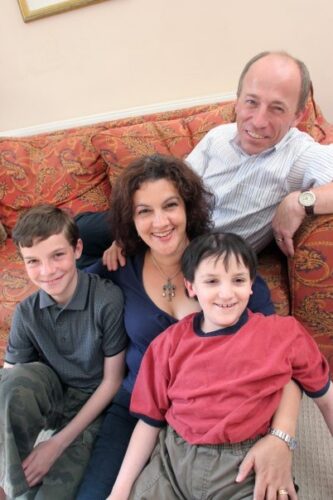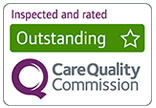
“Claire House was a lifeline for us during Michael’s illness and his final days.”
Parents Phil and Debra have been without their son Michael for longer than they had him. Read why Claire House still holds a special place in their hearts.
Our son Michael was a gorgeous little boy, with big brown eyes and dark hair,” says Phil from Chester.
Like many five-year-olds, he loved dressing up and was into Pokémon and Scooby-Doo. He was a real character!
As parents, my wife Debra and I often thought about the future for our cheeky little boy and his older brother, Stephen. Heartbreakingly, we only had Michael in our lives for 13 years – he would have been 27 in August.
It’s 13 years since Michael passed away. So, we’re now at the point where we’ve been without Michael for longer than we had him in our lives, which seems very poignant.
Despite the years gone by, Claire House will always be special to our family. They supported us and that’s why we continue to support the charity today.
It was absolute heartbreaking when Michael, aged five, was diagnosed with medulloblastoma – a cancerous brain tumour.
Michael had started being sick at school, so we took him to the doctors and he went to a specialist who didn’t find anything.
But he’d struggled to balance walking across my brother’s uneven driveway, so we took him back to the doctors and to hospital.
I remember being with Michael inside the scanner as he had his MRI scan. Soon after that, he was sent for surgery to remove the tangerine-sized tumour at The Walton Centre.
Countless hospital stays, horrible conversations about cancer treatments, chemotherapy and uncertainty followed. After his operation, Michael had to learn how to speak again and he needed a wheelchair.
Over time, we were put in touch with Claire House and Michael would go there for physio and swimming in the hydrotherapy pool. We met other families and he had an overnight stay at the hospice.
After that it was community visits, which we thought were wonderful. It meant we could always look after him at home, which is where Michael was happiest. But we knew there was backup whenever we needed it.
Although he got through the chemo, the tumour came back again. He had eight years of treatment before he passed away.
Claire House was a lifeline for us during Michael’s illness and his final days.
I will always remember him resting peacefully in the Butterfly Suite with a gorgeous grin on his face.
For us, it was about having time together and with Michael. Others could come to the suite and sit with us. I hate to think what it would have been like to go to a funeral parlour rather than to the Butterfly Suite.
When Michael passed, Claire House just took care of everything. We didn’t have to do anything, and they supported us all the way. So, we’ll always be very grateful to them.
I saw families fall apart through their child’s illness, but Debra and I were able to support each other. I would like to think we would have been able to keep together, even without support from others like Claire House, but I certainly think they made coping a lot easier. In that sense, Claire House helps to keep families together.
After Michael passed, we wanted to do something for charity. So, we set up the Michael’s Whatever appeal, named after Michael’s favourite phrase, and £7,068 went to Claire House.
The work Claire House do is invaluable. As a family, we were offered bereavement counselling to talk about Michael and the impact on Stephen.
Debra volunteered at our local Claire House charity shop in Chester and did well selling books online for the charity.
And I’m a regular donor to Claire House and I’ve done a couple of charity bike rides, including cycling from Mizen Head to Malin Head in Ireland last August. This involved nine days of cycling, covering 591 miles and climbing 31,000 feet, to raise more than £1,930.
I felt privileged that I could do this and support Claire House who was there for us throughout our journey.
We were also very keen to help educate about the HeadSmart campaign. Michael was showing classic symptoms of a brain tumour, but we didn’t know this until afterwards and the doctors didn’t initially diagnose it.

